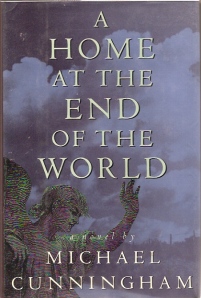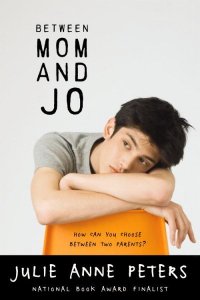This is probably the most painful book I've ever read. It's the only novel I remember making me feel physically sick at times. Not because it was gory or deliberately calibrated for shock value. It wasn't. It was just so vivid, heart-wrenching and raw.
This might not sound like a glowing recommendation for a book I'm giving a rare 5-star review. But honestly, even after having much of the story "spoiled" by seeing
the excellent film adaptation, I found this so compelling I didn't want to put it aside. The story was well-crafted, the writing gorgeous, and the characters and story impossible to get out from under my skin. I was torn between the painful feelings the book evoked and wanting to focus on the words and savor the rich, beautiful writing.
Boy A, who is never named, grows up in a part of England that seems to have abandoned hope. His father seems inexplicably estranged from him and his mum, he doesn't fare well in school, and he is the constant target of bullies. He finally finds a sense of safety, and his first experience with friendship, when he meets Boy B, who is clearly disturbed and harboring a volatile streak of rage.
Boy B is an expert at adapting to survive. He adopts the posture and attitude he needs to hold his own on the street, amid gangsters and bullies. Later, in prison, Boy B will learn a new demeanor and attitude, evolving as many times as he needs to in order to stay alive. On the streets of their hometown, Boy A learns a few survival skills from Boy B. They stop bothering to show up at school -- it's just as well; the teachers have clearly long since given up on them. They live in the shadows, lurking under bridges, in an abandoned park, and in other secret places where they feel safe and alive.
Later, after being convicted of a brutal crime, loathed by shocked and grieving citizens and exploited by the press, the two boys live parallel lives in correctional institutions. Ironically, it is here that we see their budding potential. Unsuspected reservoirs of strength and perseverance. Intelligence that their families and teachers never suspected. We begin to wonder if they are redeemable, and if they might finally get the chance their childhoods denied them.
As a 24-year-old, Boy A is released. Guided by his mentor, Terry, who has been his lifeline throughout his years of incarceration, he christens himself "Jack" and begins a new life under his new identity.
Two threads run throughout this book. In the first, we see the two boys' childhood experiences and their lives while incarcerated. There are shifts in time, and the author artfully doesn't let us learn the full truth about what happened on the day of the crime until the novel has nearly ended. So the reader suspends judgment, waits to hear all the facts before jumping to conclusions, and keeps an open heart. This is a benefit kids like Boy A and Boy B rarely get in real life.
In the second thread, Jack builds his new life.The author does an excellent job of showing how Jack is overwhelmed by the real world and quotidian life at first:
He realizes ‘wide world’ is not just an expression. Streets are broad, houses high, horizons unimaginably vast, even corner shops are commodious. Big dens of pop and videos, fags and beer. The trees are greener close up, the walls are redder, the windows more see-through. He wants to tell Terry all of this, and more. He wants to tell him how great wheely bins are, how every house should have a name like the one back there did, how telephone wires drape like bunting. He wants to shake Terry’s hand with thanks and hug him with excitement and have Terry hold him tight to quell the fear.
And:
She smiles broadly when she looks at Jack’s again. But he flicks his gaze away to his feet. She dizzies him. Jack’s not exactly well versed in flirting. There were long years when the only women he saw were a few prison teachers. Some didn’t bother to contain their loathing. ‘So when are you going to take me out for a drink, Jack?’ She’s joking but she means it too. Jack is stumped, stunned; he feels his worldly ignorance around his neck like the corpse of an albatross. Its huge wingspan is knocking over the furniture. He’s not ready for this yet.
However Jack savors the small privileges of freedom, earning a salary, meeting friends, and falling in love.
Just for an instant, before they go in, Jack looks up at the night sky and is struck by the unreality of it all. This feels like another world, another lifetime. A cool late summer’s breeze blows him the perfume of a beautiful black girl who’s one place in front. He’s with his friend Chris and his new friend Steve the mechanic. He has drunk tequila, and told people his favourite film; it’s The Blues Brothers. He didn’t know that until tonight. And inside this club, this wide-windowed warehouse, is the girl who maybe, just maybe, he could love. Jack is torn between bitterness, that he has been deprived of all this for so long, and feeling that this moment has made every other moment worth while.
Other threads are woven in, here and there. We briefly see the story through the eyes of Boy A's parents, Terry, Terry's son, and Jack's new girlfriend, Michelle. We see the little events set in motion that -- bit by bit -- destroy each character's life. The character studies and intermingled stories are magnificent.
This is a story in which innocence and evil sit side by side and often seem flipped around. Children are convicted of horrible deeds. Do we loathe them more because they seem capable of such atrocities at such a tender age, or does that predispose us to forgive them and want them to find redemption? The Juvenile Detention Center is, ironically, more brutal than the adult prison where Boy A is later sent. Jack has experienced -- and presumably committed -- more brutality in his 24 years than most people do in a lifetime, yet when released into the real world, he seems inexperienced, naive, and surprisingly open-hearted. This juxtaposition and reversal of depravity and innocence run throughout the novel, keeping us unsettled, making us think. And this author has the rare gift of making us feel empathy and loathing for the same characters, which is unnerving, painful, and enlightening.
The novel is also an indictment of the process of trial-by-media that contaminates the justice system. And it looks at the arbitrary bits and pieces of observations, feelings, and prejudices on which people base judgments.
His teacher, Mrs Johnston, née Grey, disillusioned and going through divorce, thought him lazy like his left eye. She noticed that he always seemed to be dirty, and looked like he’d been fighting. Other children told on him, even some of her nicest girls. There could be no smoke without fire. Besides, he had the same startling blue irises as her filthy, philandering fuck of a husband. Though she neglected to mention this last point at the trial.
The most harrowing thing about the novel, for me, was its study of the many ways children are damaged, by society, by adults, and by each other. I suspect I'll be thinking about this book for years, and this is the thing that's likely to stick with me the most sharply.
I have plenty of other thoughts about this novel I'd like to discuss, but I am trying to avoid spoilers. I may include some of these in a separate post. Since I finished reading
Boy A, a few hours ago, I have been anxious to talk to someone about it. If anyone has read this novel, or would like to, are you interested in a read-long or discussion?
Other Reviews of Boy A:
Rating: 5/5
| 5- Cherished Favorite | 4 - Keep in My Library | 3 - Good Read | 2 - Meh | 1 - Definitely Not
For Me |




















